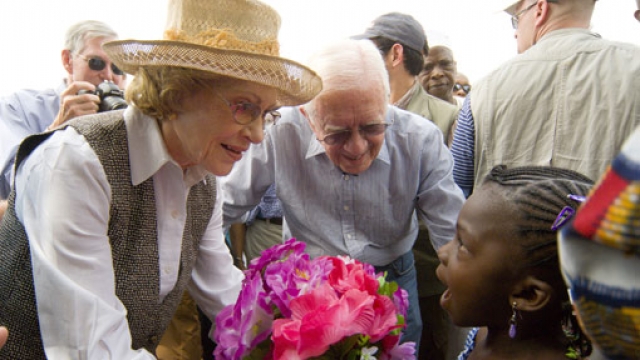Rosalynn Carter's guiding principle was, "Do what you can to show you care about other people, and you will make our world a better place," as she devoted her entire life to embodying this sentiment through her dedicated efforts.
Whether advocating for mental health parity, rallying support for families grappling with the challenges of caring for those with chronic illnesses, championing early childhood immunization or actively engaging in human rights and conflict resolution initiatives, her life was a testament to the impact one can make by caring for others.
Founded in 1982, The Carter Center in Atlanta is a nonprofit organization where the former First Lady dedicated her entire life and efforts to building what she referred to as "a more caring society."
During her time as First Lady, she advocated for disadvantaged groups, addressed discrimination, supported refugees, and promoted mandatory vaccinations in schools.
She rose as a mental health champion and played a key role in shaping the Mental Health Systems Act of 1980 as honorary chair of the President's Commission on Mental Health, established five weeks after Jimmy Carter's Inauguration Day.
From then on, she created and led the Carter Center's Mental Health Task Force, convening experts and advocates to drive positive change to improve mental health access and services across the world.
Her significant contributions at the center led to many people visiting to pay their respects to the Carter family shortly after her passing on Sunday.
"She was so compassionate and put herself behind other people in terms of their efforts to help the mentally ill and just doing the best she could for her country, for her causes for her family," said a mourner and neighbor.
Her legacy will not only live on in the Carter Center but also through her written words in books such as "Helping Yourself Help Others: A Book for Caregivers," "Helping Someone with Mental Illness: A Compassionate Guide for Family, Friends, and Caregivers," and "Within Our Reach: Ending the Mental Health Crisis."
If you need to talk to someone, call the Suicide and Crisis Lifeline by dialing 988 or text "HOME" to the Crisis Text Line at 741741.
SEE MORE: From coast to coast, tributes flow for Rosalynn Carter's passing
Trending stories at Scrippsnews.com



